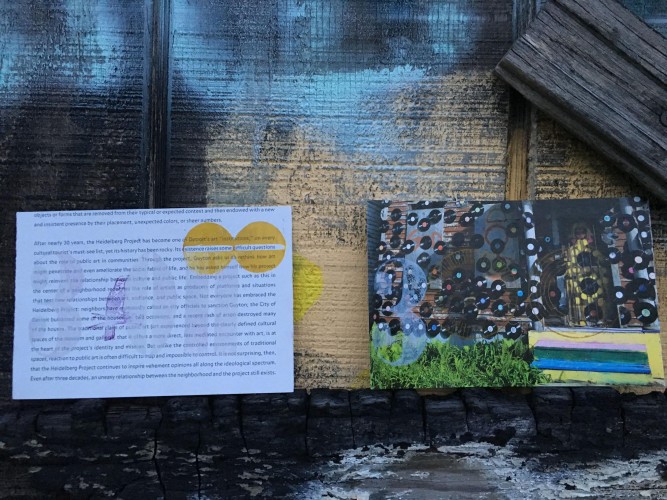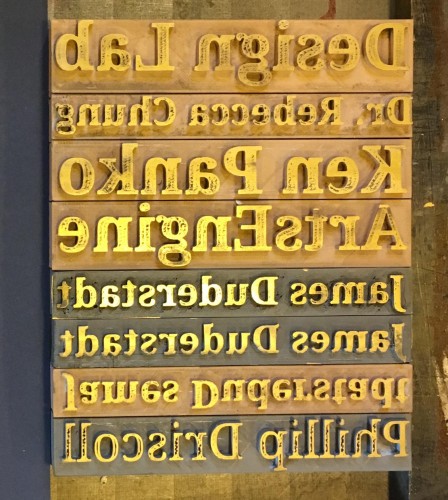
Image: Letterpress prototypes of
Heidelberg Project postcards,
taken onsite at the Vote House.
Type and ornaments from The Wolverine Press.
Now that year two of Lead-2-Pixels—and of Design Lab collaboration—is complete, my reflection begins with the tension between curricular and extracurricular learning. For some fields of study—like literature or library preservation—there is no option outside of coursework in departments and schools. For some areas of study central to research specializations—like letterpress, for book and printing history—no curricular work exists, although library-supported resources do, like the Wolverine Press and North-Campus book-arts studio. Few book historians print; fewer use both letterpress and 3D-printing together to address printing-history and conservation research questions.

Linotype-style slugs created in April 2017,
using a customized 3D printer (funded by ArtsEngine)
in collaboration with Aaron Chow.
Perhaps more importantly, most people who commit to a field like literature never have an opportunity for productive multidisciplinary work with engineers or artists. Specialized expertise has an obverse—generalized ignorance about other complex topics—even at institutions where the best literary scholars, artists, engineers, historians, and information scientists are all living and working in one place. My so-called extracurricular work is, letterpress aside, someone else’s curriculum. If I learn about 3D-printer filaments, it is like an engineer reading Borges for the first time (this exchange really happened with my partner, Aaron Chow). If a letterpress series for The Heidelberg Project combines a literary historian who prints with an anthropology doctoral student who has serious pen-and-ink skills, our collaborative awareness about the arts in cultural context does not blur lines, but creates instead a more multifocal acuity (this happened with my collaborator R. J. Miles).

Heidelberg Project 3.0 postcard: letterpress, stamping, gel pen, and repurposed paper images, with collaborator R. J. Miles. Letterpress elements from The Alternative Press, now part of the North Campus book-arts studio.
When Residents talk among themselves, we all learn something about the coursework we do not have time to do: self-care for African-American women, the conditions of incarceration, journalism in Michigan, burial mounds, University history, and preserving print culture. Also, we practice, through experience, how to respect what others know. If there is one great gift provided by programs like the Design Lab Residency, it is creating access between different kinds of learning, not just curricular versus extracurricular learning. The Residency breaks a multidisciplinary path through the undeveloped and sometimes forbidding terrain outside departments and areas that limits what students learn from one another or about fields outside of their own.

The Design Lab Residency with Kyle Bartell of Sit On It Detroit,
in Palmer Park planning a group project.
I ended up using my Residency experience as the postdoctoral student that I am. It is a credit to the University of Michigan that student-initiated research projects are a high priority. I had the rare privilege to help break a path for engaged, multidisciplinary learning in a place where every subject area is well represented, and I hope others follow the trail in years to come.

Graduation ceremony,
School of Information MSI program, with advisor Paul Conway.